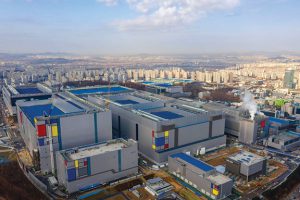Bloomberg
Samsung Electronics Co. kicked off mass production of 3-nanometer chips that are more powerful and efficient than predecessors, beating rival Taiwan Semiconductor Manufacturing Co. to a key milestone in the race to build the most
advanced chips in the world.
South Korea’s largest company will begin with 3nm semiconductors for high-performance and specialized low-power computing applications before expanding to mobile processors, it said in a statement. By applying so-called Gate-All-Around transistor architecture, Samsung’s 3nm products reduce power consumption by up to 45% and improve performance by 23% compared to 5nm chips, it said.
Samsung’s push to be first to market with the latest technology is essential in its uphill climb to match TSMC, which remains dominant in the contract chipmaking, or foundry, market. The Taiwanese firm accounts for more than half of the global foundry business by revenue and is the exclusive supplier of Apple Inc.’s Silicon processors for iPhones, iPads, MacBooks and desktop Mac PCs.
TSMC and Samsung are competing for large multiyear orders from the likes of Apple and Qualcomm Inc. 3nm mass production from the Taiwanese chipmaker will commence in the second half of the year, TSMC has said. Samsung will produce 3nm chips at its Hwaseong facilities and is expected to extend that production to its newest Pyeongtaek fab.
The Samsung Electronics Co. semiconductor manufacturing plant stands in this aerial photograph taken above Hwaseong, Gyeonggi Province, South Korea, on Monday, Dec. 16, 2019. The South Korean company is investing heavily in the next step in miniaturizing semiconductors, a process called extreme ultraviolet lithography (EUV).
Samsung’s launch of 3nm node chip production, based on a new-generation transistor architecture, shouldn’t affect TSMC’s market share and sales growth in the next 12 months. Despite stronger performance, Samsung’s 3nm chip needs to demonstrate it can be produced at the same cost-efficiency level as TSMC’s most advanced N3 process before it can gain new orders from Apple, Qualcomm and other large chip designers.
Samsung’s advance comes at a sensitive time for the semiconductor industry, whose place in global geopolitical order is currently under scrutiny by leading governments. The US and China have both taken steps to bring more chipmaking capacity and expertise within their borders — arguing it’s a matter of national security — and Samsung is in the process of setting up a new fabrication facility in Texas.
President Joe Biden took a tour of Samsung’s plant in Pyeongtaek last month and underscored semiconductor alliances as part of his agenda to strengthen international supply chains and stem chip shortages while also
reducing reliance on China.
 The Gulf Time Newspaper One of the finest business newspapers in the UAE brought to you by our professional writers and editors.
The Gulf Time Newspaper One of the finest business newspapers in the UAE brought to you by our professional writers and editors.
